- Home
- Richard Matheson
The Best of Richard Matheson Page 13
The Best of Richard Matheson Read online
Page 13
“You said . . .” Mickey said to the captain.
Ross just looked out of the port with unbelieving eyes.
“Now we’ll go up again,” Mickey said, grinding his teeth. “And we’ll really crash this time. And we’ll be killed. Just like those . . . those . . .”
Ross didn’t speak. He stared out of the port at the refutation of his last clinging hope. He felt hollow, void of all faith in belief in sensible things.
Then Mason spoke.
“We’re not going to crash—” he said somberly “—ever.”
“What?”
Mickey was looking at him. Ross turned and looked too.
“Why don’t we stop kidding ourselves?” Mason said. “We all know what it is, don’t we?”
He was thinking of what Ross had said just a moment before. About the senses giving evidence of what was believed. Even if there was nothing there at all . . .
Then, in a split second, with the knowledge, he saw Ross and he saw Carter. As they were. And he took a short shuddering breath, a last breath until illusion would bring breath and flesh again.
“Progress,” he said bitterly and his voice was an aching whisper in the phantom ship. “The Flying Dutchman takes to the universe.”
DANCE OF THE DEAD
I wanna RIDE!
With my Rota-Mota honey
By my SIDE!
As we whiz doing the highway
We will HUG and SNUGGLE
And we’ll have a
Little STRUGGLE!
struggle (strug` ’l), n., act of promiscuous loveplay;
Usage evolved during WW III.
Double beams spread buttery lamplight on the highway. Rotor-Motors Convertible, Model C, 1997, rushed after it. Light spurted ahead, yellow glowing. The car pursued with a twelve-cylindered snarling pursuit. Night blotted in behind, jet and still. The car sped on. ST. LOUIS—10.
“I wanna FLY!” they sang, “with the Rota-Mota apple of my EYE!” they sang. “It’s the only way of living . . .”
The quartet singing:
Len, 23.
Bud, 24.
Barbara, 20.
Peggy, 18.
Len with Barbara, Bud with Peggy.
Bud at the wheel, snapping around tilted curves, roaring up black-shouldered hills, shooting the car across silent flatlands. At the top of three lungs (the fourth gentler), competing with wind that buffeted their heads, that whipped their hair to lashing threads—singing:
“You can have your walkin’ under MOONLIGHT BEAMS!
At a hundred miles an hour let me DREAM my DREAMS!”
Needle quivering at 130, two 5-mph notches from gauge’s end. A sudden dip! Their young frames jolted and the thrown-up laughter of three was windswept into night. Around a curve, darting up and down a hill, flashing across a leveled—plain an ebony bullet skimming earth.
“In my ROTORY, MOTORY, FLOATERY, driving’ machi-i-i-i-ine!”
YOU’LL BE A FLOATER IN YOUR ROTOR-MOTOR.
In the back seat:
“Have a jab, Bab.”
“Thanks, I had one after supper” (pushing away needle fixed to eye-dropper).
In the front seat:
“You meana tell me this is the first time you ever been t’ Saint Loo!”
“But I just started school in September.”
“Hey, you’re a frosh!”
Back seat joining front seat:
“Hey, frosh, have a mussle-tussle.”
(Needle passed forward, eye bulb quivering amber juice.)
“Live it, girl!”
mussle-tussle (Mus` ’l-tus` ’l), n., slang for the result of injecting a drug into a muscle; usage evolved during WW III.
Peggy’s lips failed at smiling. Her fingers twitched.
“No, thanks, I’m not . . .”
“Come on, frosh!” Len leaning hard over the seat, white-browed under black blowing hair. Pushing the needle at her face. “Live it, girl! Grab a li’l mussle-tussle!”
“I’d rather not,” said Peggy. “If you don’t—”
“What’s ‘at, frosh?” yelled Len and pressed his leg against the pressing leg of Barbara.
Peggy shook her head and golden hair flew across her cheeks and eyes. Underneath her yellow dress, underneath her white brassiere, underneath her young breast—a heart throbbed heavily. Watch your step, darling, that’s all we ask. Remember, you’re all we have in the world now. Mother words drumming at her; the needle making her draw back into the seat.
“Come on, frosh!”
The car groaned its shifting weight around a curve and centrifugal force pressed Peggy into Bud’s lean hip. His hand dropped down and fingered at her leg. Underneath her yellow dress, underneath her sheer stocking—flesh crawled. Lips failed again; the smile was a twitch of red.
“Frosh, live it up!”
“Lay off, Len, jab your own dates.”
“But we gotta teach frosh how to mussle-tussle!”
“Lay off, I said! She’s my date!”
The black car roaring, chasing its own light. Peggy anchored down the feeling hand with hers. The wind whistled over them and grabbed down chilly fingers at their hair. She didn’t want his hand there but she felt grateful to him.
Her vaguely frightened eyes watched the road lurch beneath the wheels. In back, a silent struggle began, taut hands rubbing, parted mouths clinging. Search for the sweet elusive at 120 miles-per-hour.
“Rota-Mota honey,” Len moaned the moan between salivary kisses. In the front seat a young girl’s heart beat unsteadily. ST. LOUIS—6.
“No kiddin’, you never been to Saint Loo?”
“No, I . . .”
“Then you never saw the loopy’s dance?”
Throat contracting suddenly. “No, I . . . is that what . . . we’re going to—?”
“Hey, frosh never saw the loopy’s dance!” Bud yelled back.
Lips parted, slurping; skirt was adjusted with blasé aplomb. “No kiddin!” Len fired up the words. “Girl, you haven’t lived!”
“Oh, she’s got to see that,” said Barbara, buttoning a button.
“Let’s go there then!” yelled Len. “Let’s give frosh a thrill!”
“Good enough,” said Bud and squeezed her leg. “Good enough up here, right Peg?”
Peggy’s throat moved in the dark and the wind clutched harshly at her hair. She’d heard of it, she’d read of it but never had she thought she’d—
Choose your school friends carefully, darling. Be very careful.
But when no one spoke to you for two whole months? When you were lonely and wanted to talk and laugh and be alive? And someone spoke to you finally and asked you to go out with them?
“I yam Popeye, the sailor man!” Bud sang.
In back, they crowded artificial delight. Bud was taking a course in Pre-War Comics and Cartoons—2. This week the class was studying Popeye. Bud had fallen in love with the one-eyed seaman and told Len and Barbara all about him; taught them dialogue and song.
“I yam Popeye, the sailor man! I like to go swimmin’ with bow-legged women! I yam Popeye, the sailor man!”
Laughter. Peggy smiled falteringly. The hand left her leg as the car screeched around a curve and she was thrown against the door. Wind dashed blunt coldness in her eyes and forced her back, blinking. 110—115—120 miles-per-hour. ST. LOUIS—3. Be very careful, dear.
Popeye cocked wicked eye.
“O, Olive Oyl, you is my sweet patootie.”
Elbow nudging Peggy. “You be Olive Oyl—you.”
Peggy smiled nervously. “I can’t.”
“Sure!”
In the back seat, Wimpy came up for air to announce, “I will gladly pay you Tuesday for a hamburger today.”
Three fierce voices and a
faint fourth raged against the howl of wind. “I fights to the fin-ish ’cause I eats my spin-ach! I yam Popeye, the sailor man! Toot! Toot!”
“I yam what I yam,” reiterated Popeye gravelly and put his hand on the yellow-skirted leg of Olive Oyl. In the back, two members of the quartet returned to feeling struggle.
ST. LOUIS—1. The black car roared through the darkened suburbs. “On with the nosies!” Bud sang out. They all took out their plasticate nose-and-mouth pieces and adjusted them.
ANCE IN YOUR PANTS WOULD BE A PITY!
WEAR YOUR NOSIES IN THE CITY!!
ance (anse), n., slang for anticivilian germs; usage evolved during WW III.
“You’ll like the loopy’s dance!” Bud shouted to her over the shriek of wind. “It’s sen-saysh!”
Peggy felt a cold that wasn’t of the night or the wind. Remember, darling, there are terrible things in the world today. Things you must avoid.
“Couldn’t we go somewhere else?” Peggy said but her voice was inaudible. She heard Bud singing, “I like to go swimmin’ with bow-legged women!” She felt his hand on her leg again while, in the back, was the silence of grinding passion without kisses.
Dance of the dead. The words trickled ice across Peggy’s brain.
ST. LOUIS.
The black car sped into the ruins.
—
It was a place of smoke and blatant joys. Air resounded with the bleating of revelers and there was a noise of sounding brass spinning out a cloud of music—1997 music, a frenzy of twisted dissonances. Dancers, shoe-horned into the tiny square of open floor, ground pulsing bodies together. A network of bursting sounds lanced through the mass of them; dancers singing:
“Hurt me! Bruise me! Squeeze me TIGHT!
Scorch my blood with hot DELIGHT!
Please abuse me every NIGHT!
LOVER, LOVER, LOVER, be a beast-to-me!”
Elements of explosion restrained within the dancing bounds—instead of fragmenting, quivering. “Oh, be a beast, beast, beast, Beast, BEAST to me!”
“How is this, Olive old goil?” Popeye inquired of the light of his eye as they struggled after the waiter. “Nothin’ like this in Sykesville, eh?”
Peggy smiled but her hand in Bud’s felt numb. As they passed by a murky lighted table, a hand she didn’t see felt at her leg. She twitched and bumped against a hard knee across the narrow aisle. As she stumbled and lurched through the hot and smoky, thick-aired room, she felt a dozen eyes disrobing her, abusing her. Bud jerked her along and she felt her lips trembling.
“Hey, how about that!” Bud exulted as they sat. “Right by the stage!”
From cigarette mists, the waiter plunged and hovered, pencil poised, beside their table.
“What’ll it be!” His questioning shout cut through cacophony.
“Whiskey-water!” Bud and Len paralleled orders, then turned to their dates. “What’ll it be!” the waiter’s request echoes from their lips.
“Green Swamp!” Barbara said and, “Green Swamp here!” Len passed it along. Gin, Invasion Blood (1997 Rum), lime juice, sugar, mint spray, splintered ice—a popular college girl drink.
“What about you, honey?” Bud asked his date.
Peggy smiled. “Just some ginger ale,” she said, her voice a fluttering frailty in the massive clash and fog of smoke.
“What?” asked Bud and, “What’s that, didn’t hear!” the waiter shouted.
“Ginger ale.”
“What!”
“Ginger ale!”
“GINGER ALE!” Len screamed it out and the drummer, behind the raging curtain of noise that was the band’s music, almost heard it. Len banged down his fist. One—Two—Three!
CHORUS: Ginger Ale only twelve years old!
Went to church and was as good as gold.
Till that day when—
“Come on, come on!” the waiter squalled. “Let’s have that order, kids! I’m busy!”
“Two whiskey-waters and two Green Swamps!” Len sang out and the waiter was gone into the swirling maniac mist.
Peggy felt her young heart flutter helplessly. Above all, don’t drink when you’re out on a date. Promise us that, darling, you must promise us that. She tried to push away instructions etched in brain.
“How you like this place, honey? Loopy, ain’t it?” Bud fired the question at her; a red-faced, happy-faced Bud.
loopy (lôô´pî), adj., common alter. of L.U.P.
She smiled at Bud, a smile of nervous politeness. Her eyes moved around, her face inclined and she was looking up at the stage. Loopy. The word scalpeled at her mind. Loopy, loopy.
The stage was five yards deep at the radius of its wooden semicircle. A waist-high rail girdled the circumference, two pale purple spotlights, unlit, hung at each end. Purple on white—the thought came. Darling, isn’t Sykesville Business College good enough: No! I don’t want to take a business course, I want to major in art at the University!
The drinks were brought and Peggy watched the disembodied waiter’s arm thud down a high-green-looking glass before her. Presto!—the arm was gone. She looked into the murky green swamp depths and saw chipped ice bobbing.
“A toast! Pick up your glass, Peg!” Bud clarioned.
They all clinked glasses:
“To lust primordial!” Bud toasted.
“To beds intemperate!” Len added.
“To flesh insensate!” Barbara added a third link.
Their eyes zeroed in on Peggy’s face, demanding. She didn’t understand.
“Finish it!” Bud told her, plagued by freshman sluggishness.
“To . . . u-us,” she faltered.
“How o-ri-ginal,” stabbed Barbara and Peggy felt heat licking up her smooth cheeks. It passed unnoticed as three Youths of America with Whom the Future Rested gurgled down their liquor thirstily. Peggy fingered at her glass, a smile printed to lips that would not smile unaided.
“Come on, drink, girl!” Bud shouted to her across the vast distance of one foot. “Chuggalug!”
“Live it, girl,” Len suggested abstractedly, fingers searching once more for soft leg. And finding, under the table, soft leg waiting.
Peggy didn’t want to drink, she was afraid to drink. Mother words kept pounding—never on a date, honey, never. She raised the glass a little.
“Uncle Buddy will help, will help!”
Uncle Buddy leaning close, vapor of whiskey haloing his head. Uncle Buddy pushing cold glass to shaking young lips. “Come on, Olive Oyl, old goil! Down the hatch!”
Choking sprayed the bosom of her dress with green swamp droplets. Flaming liquid trickled into her stomach, sending offshoots of fire into her veins.
Bangity boom crash smash POW!! The drummer applied the coup de grace to what had been, in ancient times, a lover’s waltz. Lights dropped and Peggy sat coughing and tear-eyed in the smoky cellar club.
She felt Bud’s hand clamp strongly on her shoulder and, in the murk, she felt herself pulled off balance and felt Bud’s hot wet mouth pressing at her lips. She jerked away and then the purple spots went on and a mottle-faced Bud drew back, gurgling, “I fights to the finish,” and reaching for his drink.
“Hey, the loopy now, the loopy!” Len said eagerly, releasing exploratory hands.
Peggy’s heart jolted and she thought she was going to cry out and run thrashing through the dark, smoke-filled room. But a sophomore hand anchored her to the chair and she looked up in white-faced dread at the man who came out on the stage and faced the microphone which, like a metal spider, had swung down to meet him.
“May I have your attention, ladies and gentlemen,” he said, a grim-faced, sepulchral-voiced man whose eyes moved out over them like flicks of doom. Peggy’s breath was labored, she felt thin lines of green swamp water filtering hotly through her chest and stomach. It made her blink dizz
ily. Mother. The word escaped cells of the mind and trembled into conscious freedom. Mother, take me home.
“As you know, the act you are about to see is not for the faint of heart, the weak of will.” The man plodded through the words like a cow enmired. “Let me caution those of you whose nerves are not what they ought to be—leave now. We make no guarantees of responsibility. We can’t even afford to maintain a house doctor.”
No laughter appreciative. “Cut the crap and get off stage,” Len grumbled to himself. Peggy felt her fingers twitching.
“As you know,” the man went on, his voice gilded with learned sonority, “This is not an offering of mere sensation but an honest scientific demonstration.”
“Loophole for Loopy’s!” Bud and Len heaved up the words with the thoughtless reaction of hungry dogs salivating at a bell.
It was, in 1997, a comeback so rigidly standard it had assumed the status of a catechism answer. A crenel in the postwar law allowed the LUP performance if it was orally prefaced as an exposition of science. Through this legal chink had poured so much abusing of the law that few cared any longer. A feeble government was grateful to contain infractions of the law at all.
When hoots and shoutings had evaporated in the smoke-clogged air, the man, his arms upraised in patient benediction, spoke again.
Peggy watched the studied movement of his lips, her heart swelling, then contracting in slow, spasmodic beats. An iciness was creeping up her legs. She felt it rising toward the threadlike fires in her body and her fingers twitched around the chilly moisture of the glass. I want to go, please take me home—Will-spent words were in her mind again.
“Ladies and gentlemen,” the man concluded, “brace yourselves.”
A gong sounded its hollow, shivering resonance, the man’s voice thickened and slowed.
“The L.U. Phenomenon!”
The man was gone; the microphone had risen and was gone. Music began; a moaning brassiness, all muted. A jazzman’s conception of the palpable obscure—mounted on a pulse of thumping drum. A dolor of saxophone, a menace of trombone, a harnessed bleating of trumpet—they raped the air with stridor.
Peggy felt a shudder plaiting down her back and her gaze dropped quickly to the murky whiteness of the table. Smoke and darkness, dissonance and heat surrounded her.

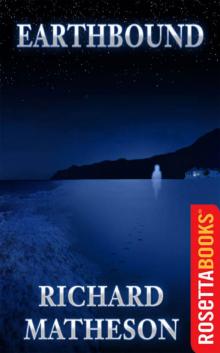 Earthbound
Earthbound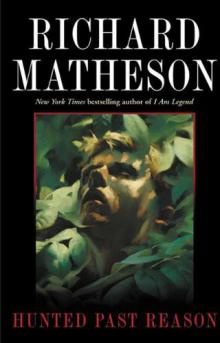 Hunted Past Reason
Hunted Past Reason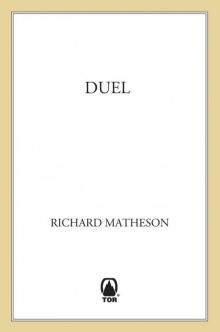 Duel: Terror Stories
Duel: Terror Stories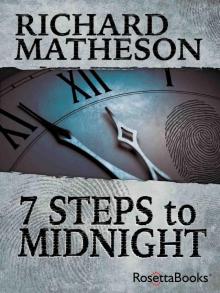 7 Steps to Midnight
7 Steps to Midnight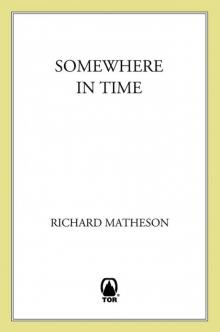 Somewhere in Time
Somewhere in Time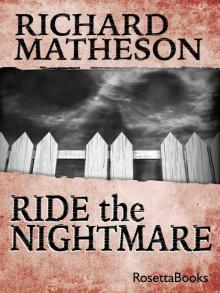 Ride the Nightmare
Ride the Nightmare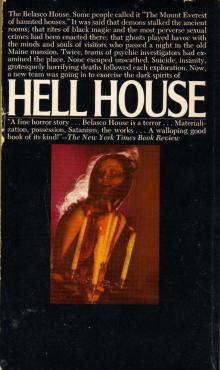 Hell House
Hell House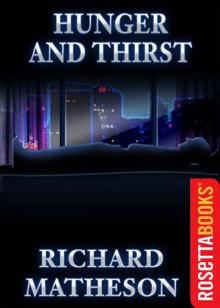 Hunger and Thirst
Hunger and Thirst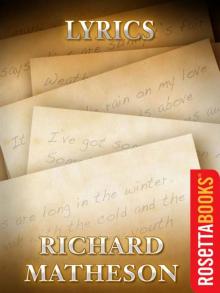 Lyrics
Lyrics Other Kingdoms
Other Kingdoms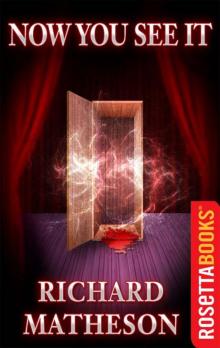 Now You See It . . .
Now You See It . . .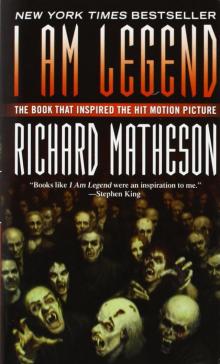 I Am Legend
I Am Legend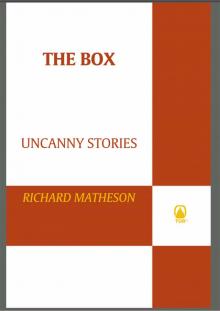 The Box: Uncanny Stories
The Box: Uncanny Stories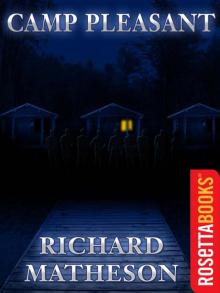 Camp Pleasant
Camp Pleasant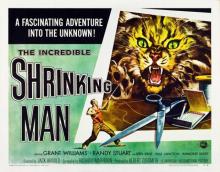 The Incredible Shrinking Man
The Incredible Shrinking Man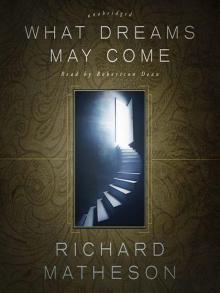 What Dreams May Come
What Dreams May Come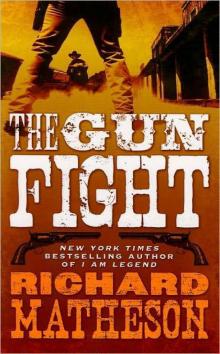 The Gun Fight
The Gun Fight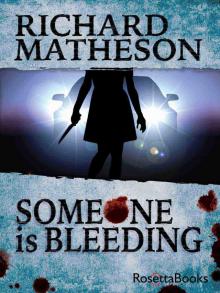 Someone Is Bleeding
Someone Is Bleeding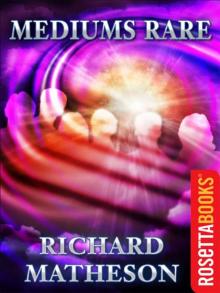 Mediums Rare
Mediums Rare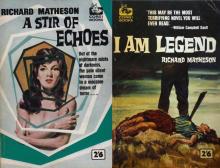 A Stir of Echoes
A Stir of Echoes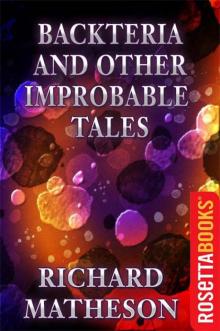 Backteria and Other Improbable Tales
Backteria and Other Improbable Tales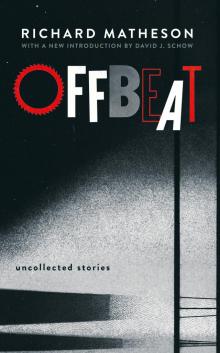 Offbeat: Uncollected Stories
Offbeat: Uncollected Stories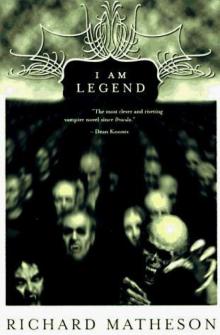 I Am Legend and Other Stories
I Am Legend and Other Stories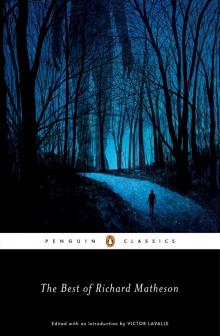 The Best of Richard Matheson
The Best of Richard Matheson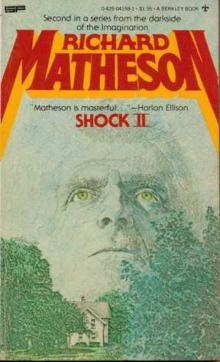 Shock II
Shock II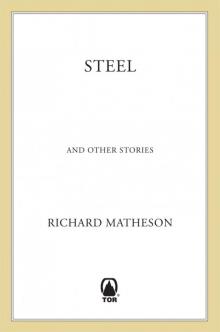 Steel: And Other Stories
Steel: And Other Stories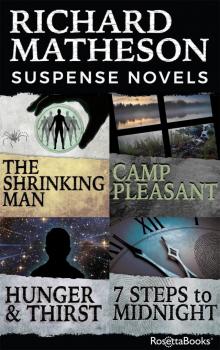 Richard Matheson Suspense Novels
Richard Matheson Suspense Novels The Link
The Link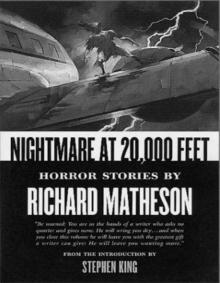 Nightmare At 20,000 Feet
Nightmare At 20,000 Feet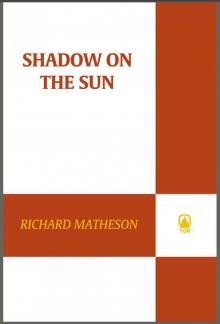 Shadow on the Sun
Shadow on the Sun![Steel and other stories [SSC] Read online](http://i1.bookreadfree.com/i/03/21/steel_and_other_stories_ssc_preview.jpg) Steel and other stories [SSC]
Steel and other stories [SSC] Created By
Created By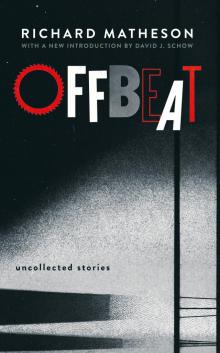 Offbeat
Offbeat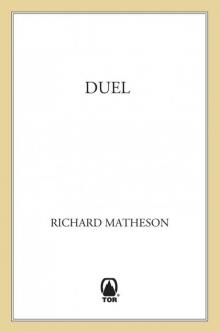 Duel
Duel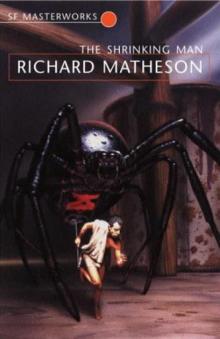 The Shrinking Man
The Shrinking Man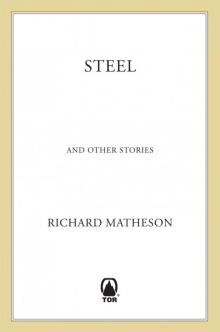 Steel
Steel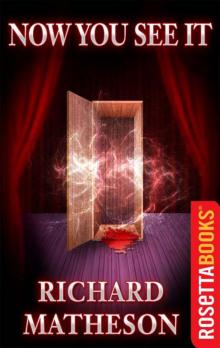 Now You See It
Now You See It